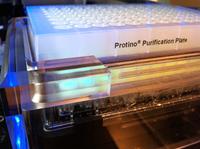Recombinant Protein Purification

(PresseBox) - Purifying proteins is central to both studying their function, structure or interactions as well as for industrial scale manufacturing of bio-therapeutics.
Recombinant proteins can be easily purified using affinity chromatography. With this technique, the protein is usually genetically modified with a specific tag that allows the scientist to purify the protein of interest very selectively. The most commonly used tag is hexahistidine, which has a high affinity to cobalt or nickel immobilized with an NTA anchor incorporated in the stationery phase. Elution can be easily performed by a competing reagent, such as imidazole, which acts as a metal ion ligand. To isolate nearby pure proteins, scientists must be able to evaluate suitable resins and ensure proper purification conditions.
Hamilton has developed together with Macherey-Nagel a validated method supporting the Protino® Purification plate. The method can be used on the Genomic Starlet but also on any other system which is equipped with 4 to 8 channels, a CVS and a Hamilton heater shaker.
The method supports Batch Binding of the protein towards the resin which allows the user to saturate the resin completely with recombinant protein in order to achieve the maximum yield without limitations in purity and without the risk of blockage of wells later on. Batch binding is possible due to the absolutely leak-free Protino® Purification plate which can be used liquid filled directly on a shaker at 1100rpm.
Using 50 ?l of Protino Ni-NTA Agarose yields up to 2.5 mg of target protein per well can be expected with an average standard deviation of less than 4%. The average processing time for 96 samples is between 1h 20min and 1h 50min depending on the expected yield. Variations in timing mainly come from the batch binding time.
For further information please refer to the application note ?Fast and automated protein purification with MACHEREY-NAGEL Protino® 96 Ni-NTA Purification system?.
Mit der Entwicklung der Mikroliterspritze gründete Clark Hamilton 1947 einen Konzern der bis heute als Synonym für präzise Flüssigkeitsdosierung steht. Mit der MICROAB® STAR Line revolutionierte HAMILTON die automatische Flüssigkeitsdosierung durch Innovationen wie vollständig unabhängige, asymmetrisch spreizbarer Pipettierkanäle, "Dual Liquid Level Detection" und "Monitored Air Displacement" für höchste Prozessstabilität und überlegene Pipettierresultate.HAMILTON hat sich zum Ziel gesetzt, durch "Innovation for Automation" zufriedene Kunden zu gewinnen und sich dadurch als führendes Unternehmen für automatisiertes Liquid Handling in den Life Sciences zu etablieren.
Themen in diesem Fachartikel:
Unternehmensinformation / Kurzprofil:
Mit der Entwicklung der Mikroliterspritze gründete Clark Hamilton 1947 einen Konzern der bis heute als Synonym für präzise Flüssigkeitsdosierung steht. Mit der MICROAB® STAR Line revolutionierte HAMILTON die automatische Flüssigkeitsdosierung durch Innovationen wie vollständig unabhängige, asymmetrisch spreizbarer Pipettierkanäle, "Dual Liquid Level Detection" und "Monitored Air Displacement" für höchste Prozessstabilität und überlegene Pipettierresultate.HAMILTON hat sich zum Ziel gesetzt, durch "Innovation for Automation" zufriedene Kunden zu gewinnen und sich dadurch als führendes Unternehmen für automatisiertes Liquid Handling in den Life Sciences zu etablieren.
Datum: 29.04.2014 - 15:04 Uhr
Sprache: Deutsch
News-ID 1052541
Anzahl Zeichen: 0
Kontakt-Informationen:
Ansprechpartner:
Stadt:
Martinsried
Telefon:
Kategorie:
Biotechnologie
Anmerkungen:
Dieser Fachartikel wurde bisher 473 mal aufgerufen.
Der Fachartikel mit dem Titel:
"Recombinant Protein Purification"
steht unter der journalistisch-redaktionellen Verantwortung von
HAMILTON Robotics GmbH (Nachricht senden)
Beachten Sie bitte die weiteren Informationen zum Haftungsauschluß (gemäß TMG - TeleMedianGesetz) und dem Datenschutz (gemäß der DSGVO).




